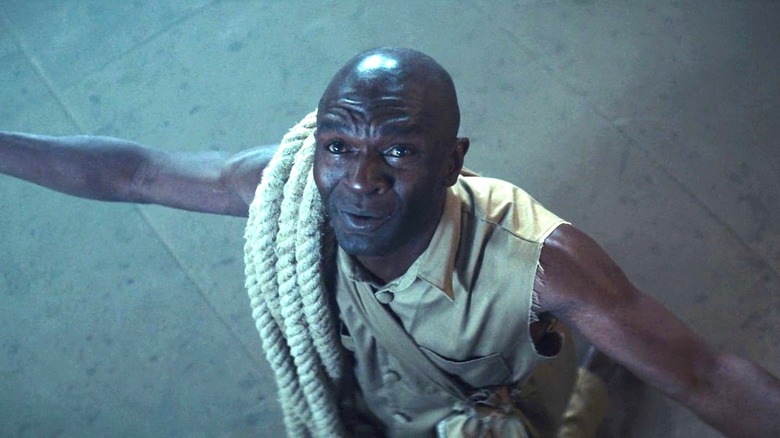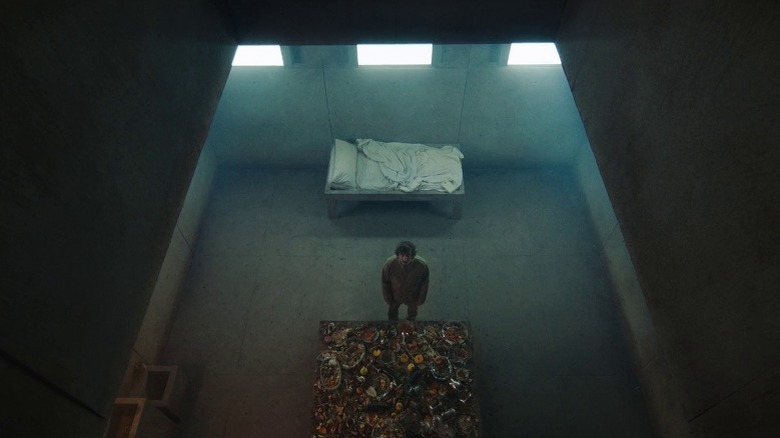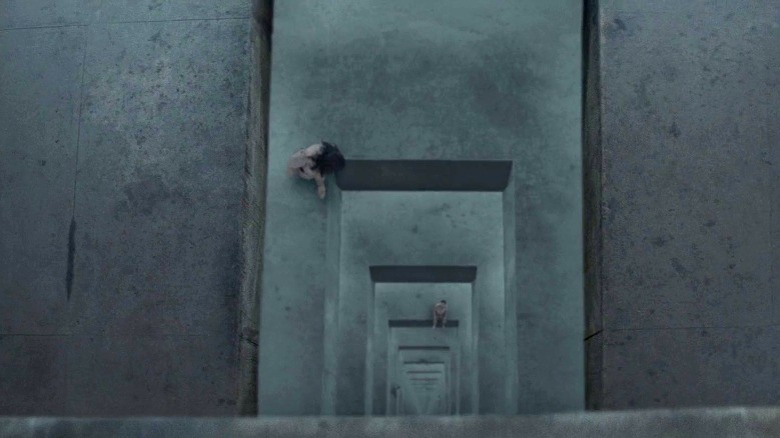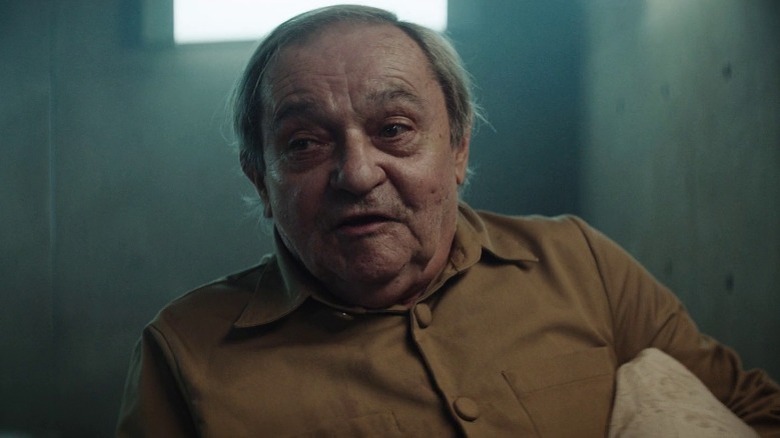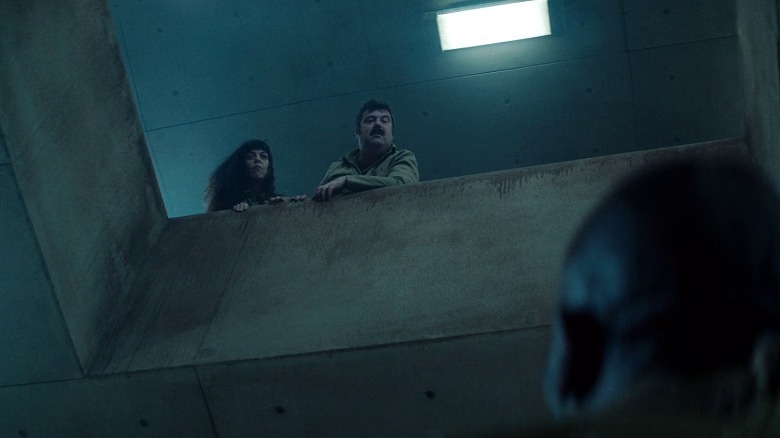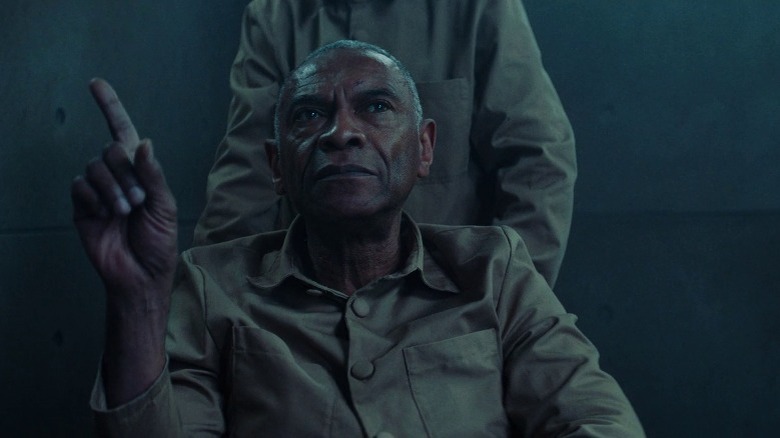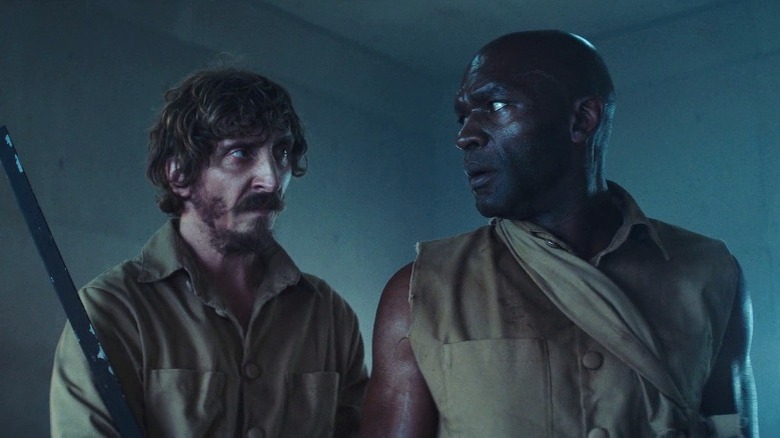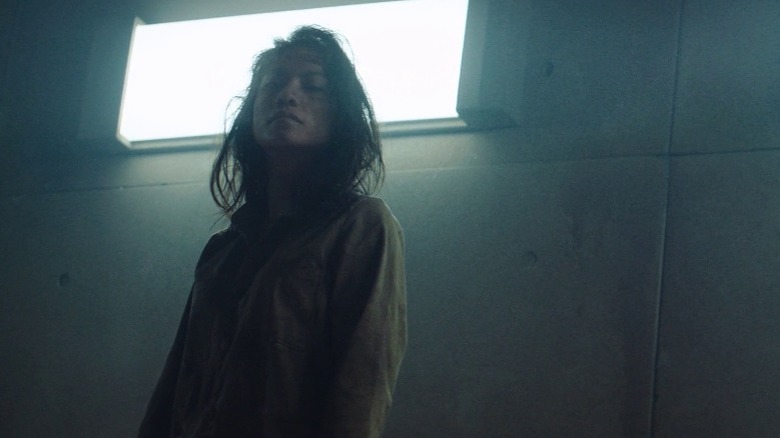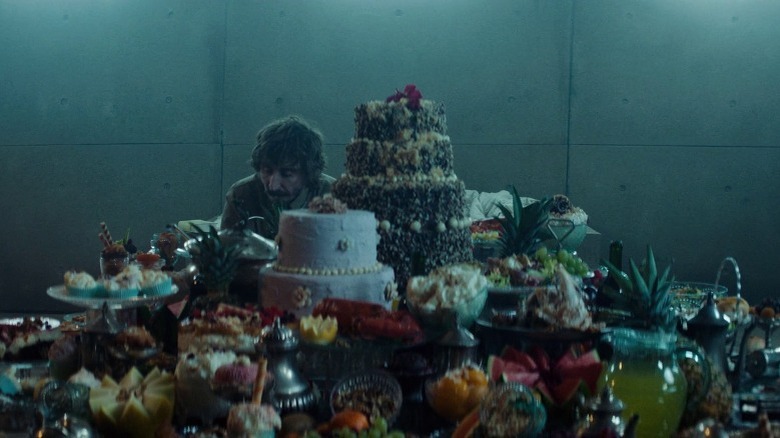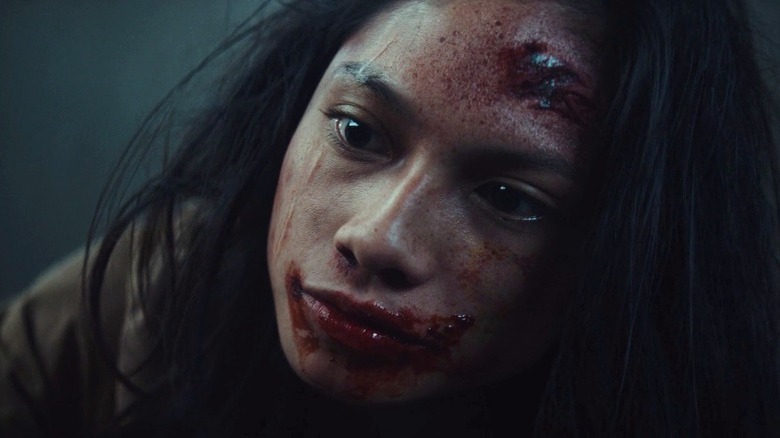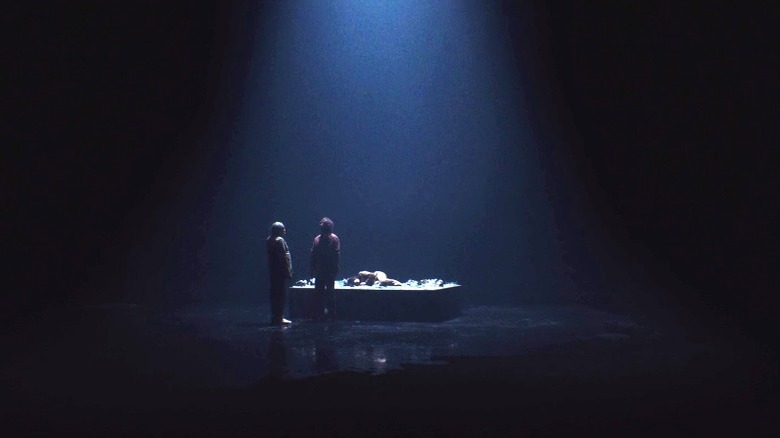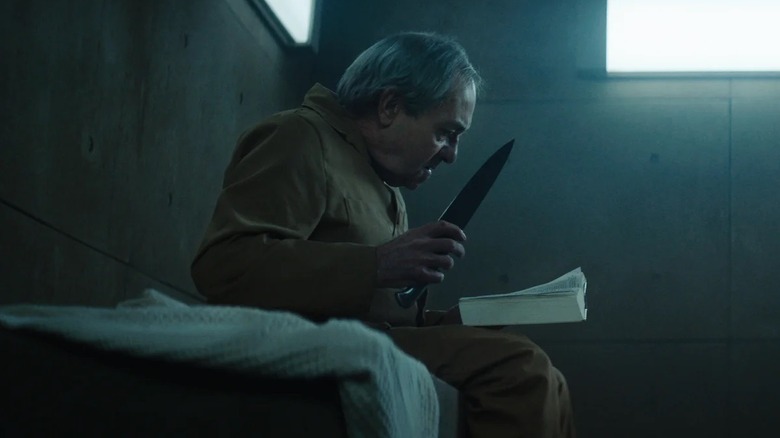We Rewatched The Platform And It's Completely Different Now
Netflix has had its share of successful feature films, but few can claim to have left as much of a cultural footprint as "The Platform." Written by David Desola and Pedro Rivero and directed by Galder Gaztelu-Urrutia, the Spanish film premiered at the Toronto International Film Festival in 2019 before arriving on the streamer in March 2020. Not long after it made its way to general audiences, "The Platform" became one of the biggest hits of pandemic-era cinema, with its tale of a detainment center using an unorthodox food distribution system transfixing many millions of households in Spain and beyond.
Gaztelu-Urrutia's hit film is back in the news due to the release of its long-awaited follow-up, "The Platform 2." And, as the world revisits "The Platform" four years later, with many viewers watching it for the first time since those strange, blurry quarantine days, new layers and details — some flattering, some iffy — will surely emerge. For our part, we rewatched "The Platform" and realized that watching the movie in 2024 is a completely different experience, for a multitude of reasons that deserve some unpacking.
The Pit's claustrophobia hits differently in 2024
When "The Platform" hit Netflix worldwide in March 2020, the COVID-19 pandemic was in full swing and months of quarantining were still ahead. The film hit with a particular amount of force back then due to the way that it spoke to the general feeling of isolation that we were all having to deal with in those days. Seeing Goreng (Iván Massagué) get gradually used to the reality of a confinement he thought would be much easier to deal with, fret over provisions, and slowly lose his mind felt eerily familiar.
In 2024, the experience of watching the movie has been transformed by circumstances. Now, although COVID-19 is still very much a pressing public health concern in many parts of the world, including the U.S., we've spent nearly three years getting used to going outside again, and the claustrophobia of "The Platform" has taken on a new connotation. Instead of reflecting the public's current circumstances, the movie takes us back to the state of mind we were once in. Given how challenging the return to "normal life" has been for many, it's now easy to recognize oneself in that final scene, with Goreng wandering in the dark, unsure of where he's going or where he should be going now that he's no longer trapped.
The class metaphor is still depressingly relevant
It's no secret that inequality is still one of the world's great ills in 2024. The various crises of late-stage capitalism that humanity has faced in the past few decades are almost too complex and mind-boggling to fully grasp, but what remains unmistakable through and through is that the poor stay poor and the rich keep getting richer. That was one of the reasons "The Platform" struck a nerve in 2020, and this also explains the success of other hit films from that era. Another example is "Parasite," which rode a wave of enormous crossover popularity all the way to a best picture Oscar win just a few weeks before the Netflix premiere of "The Platform."
To put it lightly, the intervening years have not made the class metaphor less potent. According to Oxfam (via the World Economic Forum), inequality around the world has actually increased since the pandemic. For a lot of the working class, life feels increasingly like a series of fights for scraps from the top, while the wealthy hoard power and resources and gorge shamelessly on more than they need. Even the ongoing shrinking of the middle class adds extra poignancy to the film's depiction of the people on levels 10 to 50 as self-important pigs in a pen, feeling superior to the people below even while scraping meat off chicken bones left over by those above.
The rise of AI adds a new layer to the commentary
Back when "The Platform" came out, the concept of generative AI was still a long way away from its current boom. A lot of the discourse has been around AI replacing writers, filmmakers, and artists, but there's also the fact that its arrival has sent emissions at tech companies through the roof. Not only do AI data centers emit a lot of carbon, but they also consume a lot of water for cooling. Specialists have raised concerns about the world's ecosystems not being able to sustain the ongoing AI frenzy at its current pace if computation stays at its current level of energy efficiency. And environmental damage, of course, impacts our everyday standard of living.
Watching "The Platform" now, you can't help but notice that the critique of waste and individualism doesn't seem limited to class warfare in and of itself. There's now an unmistakable environmental slant to the film's insistence that selfishness in managing the world's resources will result in scarcity, chaos, and suffering. The consumer benefits offered by large language models have, as a very real and inescapable collateral effect, launched untold amounts of carbon into the atmosphere, contributing to the disturbance of our world's delicate climate balance.
The movie is disappointingly muted in its critique of racism and xenophobia
To its credit, "The Platform" acknowledges that individualist classism is intertwined with other forms of bigotry. Early on, while telling the story of how he wound up in the Pit by throwing a TV out the window and accidentally dropping it on an undocumented immigrant, Trimagasi (Zorion Eguileor) complains that his arrest was unfair because the immigrant shouldn't have been in the country — showing that his lack of solidarity and his hostility towards other humans were already in place well before his sentence. Later, the couple on level 5 (Chema Trujillo and Miriam Martín) proves racist and xenophobic in their treatment of Baharat (Emilio Buale), openly expressing suspicion of him due to him being Black and demanding that he prove he's Christian in order to indulge his pleas for help.
However, despite these nods to the pestilence of white nationalism in Spanish society and the world at large, the movie doesn't really explore racism as deeply as it could. Trimagasi is still depicted as a bearer of some measure of wisdom and even morality despite his ugly worldview, with his imaginary mentor role in Goreng's psyche painting him in a sympathetic light. In a world that has only seen white nationalist politics and rhetoric grow louder and more aggressive since 2020 — not only in Europe but in the U.S. — the film's subtle depiction doesn't feel incisive enough. Racial and ethnic politics aren't just a subtle detail in the grand scheme of class warfare; they're a central piece of the puzzle.
Cynical politics don't feel so urgent anymore...
Whatever your ultimate takeaway from it may be, it's hard to disagree that "The Platform" is a cynical film. From beginning to end, it could be argued that the movie operates under the general belief that humans are fundamentally selfish, incapable of solidarity or collaboration. Even when Goreng and Baharat set out to disprove that idea and instill some sense of collectivism in people, it doesn't work, and what little they manage to preserve of the food as they descend to the lower levels is only salvaged through violence.
That message — people suck — spoke to us a lot during the pandemic, which exposed a lot of selfish behavior at supermarkets and beyond. A lot of people failed to band together in solidarity and work toward the common good. But now, years later, cynicism about humans feels more unhelpful than anything. Yes, people can and often do suck, but we have to rebuild the world, and we have to hang on to the specks of generosity and collectivism that humankind has displayed in the past four years as evidence that it is possible to do so. The "The Platform" now feels like a relic, taking you back to a time when freaking out was understandable and inevitable. After all, if people suck, it's only because they're capable of hurting and ignoring the plight of other people. One way or another, in the end, people still matter.
...but thematic bluntness is more in style
"The Platform" is not a subtle film. It practically explains itself to you: Trimagasi lays out the rules of the Pit with the patience of an IMDb plot summary, pausing at appropriate times to make sure both Goreng and the audience understand the underlying sociological implications of the Pit's mechanics. Even his catchphrase is "Obviously." As metaphors go, it doesn't get more plain and self-explanatory than "the people above get all the food while the people below get fewer and fewer scraps." The point of the film is not nuance or delicacy. It's unapologetically blunt. That's not, in itself, a bad thing. In fact, in 2024, it may be a very good thing.
These days, popular films that tackle social issues are throwing subtlety to the wind and opting to wear their "messages" on their sleeve. "Barbie" sprang for a monologue on sexism that took two full days to shoot; "Saltburn" and "The Menu" exploded class warfare into garish extremes; "Glass Onion" was even more direct and clear in its satire than "Knives Out." 2024's "The Substance" — a movie that's becoming a sizable cultural force despite its limited box office — blew social media open like a powder keg by eschewing any trace of subtlety in its send-up of the beauty industry. With the world getting more nightmarishly absurd by the day, subtlety in art just might be losing its luster as a way to reflect how we're all living and feeling.
The silent Asian character trope is more dated than ever
The character of Miharu (Alexandra Masangkay), the mysterious woman who keeps descending the Pit every month in search of her child, plays a substantial role in the plot of "The Platform." But she doesn't speak a single word in the film — and no reason is given for why that might be. Sadly, Miharu belongs to the troubling tradition of silent or near-silent Asian characters in Western media.
These characters, which can also sometimes be men but are often a female-specific trope, all share general archetypal characteristics: They're stern, stoic, charismatic, lethally efficient in combat, and emotionally opaque. Their lack of speech reflects long-standing Western stereotypes about East Asians, and especially East Asian women, being quiet and reserved. More often than not, it also reflects a lack of a fully-developed personality, which in turn speaks to a writer's desire to incorporate a certain "cool Asian assassin" aesthetic without knowing how to imagine rich inner lives for Asian women.
Jimmy Wong ("Mulan") brought the issue up on Twitter (via Affinity) not long after "The Platform" came out, writing, "Least favorite acting thing I've noticed during pandemic binge watching: incredibly sexy and good looking Asian actors playing characters with barely ANY dialogue because it's supposed to be... mysterious?" Looking back on "The Platform" now, the unabashed stereotyping of Miharu feels even more trite and dated than it already did in 2020.
A curious relationship to mukbang videos
More than just a vehicle for blunt and effective messages about the insanity of wealth inequality, "The Platform" is a searing audiovisual experience, full of memorable touches of gruesomeness and horror. The imagery of enormous amounts of food being gorged on, for instance, is almost ineffably transfixing — there's just something about the morbidity of desperate and unrestrained food consumption that draws the eye. In 2020, part of that transfixing appeal was tied to mukbang videos, a cultural phenomenon that was then at its arguable peak.
Mukbang videos — in which people consume enormous amounts of food on camera for viewers' entertainment — began an upswing of international popularity around the mid-2010s. By the time "The Platform" was released, the iconography of mukbangers hunched over obscenely plentiful meal tables was already seared into the minds of millions around the globe. "The Platform" evoked, and was possibly buoyed by, that visual connection.
2024, meanwhile, is a different time for mukbang videos. As the genre emerged into the mainstream, it also began to face increased scrutiny from politicians, the public, and the media. Nutrition specialists have accused mukbangers of promoting unhealthy eating habits; China has banned them for contributing to food waste; and a prominent mukbang star named Nikocado Avocado broke the internet by revealing he'd spent two years posting pre-recorded videos while secretly losing weight. Now, the film's mukbang-adjacent images feel strangely ahead of their time in their grotesque, foreboding gloom.
Pragmatic cannibalism seems so tame nowadays
Across the history of horror cinema, the consumption of human flesh has cropped up again and again as the ultimate, most radical, most horrifying act one can commit. But, because cannibalism is so taboo, it has rarely been depicted explicitly in mainstream media. "The Platform" made waves in 2020 as a rare mass-appeal movie that depicted cannibalism unflinchingly, cuts and bites and blood and all, which helped make its reputation as one of the darkest movies on Netflix.
Since 2020, however, the cannibalism taboo has lost some of its spiciness, so to speak. There have been several mainstream films and shows that depict cannibalism quite openly — and not only as a practice, but as an extreme representation of desire and devotion. "Yellowjackets," which was based on a harrowing real life tragedy, features cannibalism as the linchpin of its fraught psychosexual maze. "Bones and All" pushes it as far as it can be pushed as a metaphor for young, all-consuming love. Even "Society of the Snow," with its more "respectable" bent, still posits cannibalism-for-survival and its acceptance as a loving exchange, a deeply meaningful act of self-sacrifice and generosity.
In the current landscape, "The Platform," with its weary, unglamorous, strictly-pragmatic cannibalism, feels almost endearingly old-fashioned. There is, of course, something transgressive in itself about depicting cannibalism so matter-of-factly — but it's now hard not to wonder what the movie could have looked like had the homoerotic undertones between Goreng and Trimagasi gone beyond subtext.
The lack of answers was thrilling, and the backtracking was inevitable
Part of the reason "The Platform" became a cultural phenomenon in 2020 was its simplicity. We never learn the exact details of who built the Pit, why, where it's located, what function it fulfills, what has become of society around it. Even the ending of "The Platform" is quite open, with Goreng merely sending the girl (Zihara Llana) up and walking off into the dark without knowing where he is or where he's going. In a world where nearly all mainstream movies feel a need to over-explain themselves, the lack of clear answers or explanations added greatly to the mystique. It was a movie that left fans scratching their heads in the best way.
Just as that opacity felt thrilling at the time, however, it seems inevitable now that it couldn't stand. A hit like "The Platform" couldn't remain alone, cryptic and self-contained, under the current streaming economy. It had to be solved. And solved it was, with "The Platform 2" going back to the early days of the Pit and filling us in on some of the details that "The Platform" deliberately left out, including confirmation of the oft-floated fan theory that each inmate was only supposed to eat their favorite food. What it doesn't offer is an equally engaging movie — which was to be expected. Rewatching "The Platform" now, it's clear that a sequel was always going to be redundant, and that additional information would only shortchange the original's fable-like power.
The Platform also works as a critique of streaming services
The distribution of wealth and resources — including food itself — is not the only thing that the titular platform and its daily banquets can stand for in "The Platform." Sure, that's the most intuitive interpretation, but, in 2024, there's another reading that's just as feasible — albeit almost certainly unintentional. The powers in charge of the Pit can be seen as a metaphor for how some streaming services treat subscribers: Sending down whatever to the inmates in hopes that they will eat it without complaint, expecting them to munch on calories indiscriminately as long as it keeps them fed.
The years since 2020 have taught us a lot about the underside of the streaming economy and its tendency to treat movies and TV shows like "content" to be smashed indiscriminately into eyeballs. The bubble burst during the 2023 SAG-AFTRA strike, which revealed that the entire streaming model hinges on consumer inertia, passive viewing, and the offering of just enough entertainment to keep the subscription fees flowing, with little to no care for the individual quality or audience appeal of specific films and shows. It's hilariously ironic that this huge streaming hit is about an organization presenting slop to people knowing that, even if they don't particularly enjoy it, they'll consume it all the same.
"The Platform 2" is out now on Netflix.
